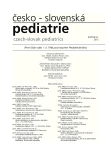-
Medical journals
- Career
What should be relaxed and why?
Authors: K. Nešpor; Anna Babková
Authors‘ workplace: Oddělení léčby závislostí – muži, Psychiatrická léčebna Bohnice, Praha, primář MUDr. K. Nešpor
Published in: Čes-slov Pediat 2012; 67 (2): 133-135.
Category: Actual Topic
Sources
1. Bastani F, Hidarnia A, Kazemnejad A, Vafaei M, Kashanian M. A randomized controlled trial of the effects of applied relaxation training on reducing anxiety and perceived stress in pregnant women. J Midwifery Womens Health 2005; 50 (4): e36–40.
2. de Niet G, Tiemens B, Lendemeijer B, Hutschemaekers G. Music-assisted relaxation to improve sleep quality: meta-analysis. J Adv Nurs 2009; 65 (7): 1356–1364.
3. Ekman P, Davidson RJ, Friesen WV. The Duchenne smile: emotional expression and brain physiology. II. J Pers Soc Psychol 1990; 58 (2): 342–353.
4. Gitlin B, Martin J, Shear MK, Frances A, Ball G, Josephson S. Behavior therapy for panic disorder. J Nerv Ment Dis 1985; 173 (12): 742–743.
5. Gustavsson C, von Koch L. Applied relaxation in the treatment of long-lasting neck pain: a randomized controlled pilot study. J Rehabil Med 2006; 38 (2): 100–107.
6. Han JN, Stegen K, De Valck C, Clément J, Van de Woestijne KP. Influence of breathing therapy on complaints, anxiety and breathing pattern in patients with hyperventilation syndrome and anxiety disorders. J Psychosom Res 1996; 41 (5): 481–493.
7. Kabat-Zinn J, Wheeler E, Light T, Skillings A, Scharf MJ, et al. Influence of a mindfulness meditation-based stress reduction intervention on rates of skin clearing in patients with moderate to severe psoriasis undergoing phototherapy (UVB) and photochemotherapy (PUVA). Psychosom Med 1998; 60 (5): 625–632.
8. Kim KS, Lee SW, Choe MA, Yi MS, Choi S, Kwon SH. Effects of abdominal breathing training using biofeedback on stress, immune response and quality of life in patients with a mastectomy for breast cancer. Taehan Kanho Hakhoe Chi 2005; 35 (7): 1295–1303.
9. Manzoni GM, Pagnini F, Castelnuovo G, Molinari E. Relaxation training for anxiety: a ten-years systematic review with meta-analysis. BMC Psychiatry 2008; 8 : 41.
10. Melville GW, Chang D, Colagiuri B, Marshall PW, Cheema BS. Fifteen minutes of chair-based yoga postures or guided meditation performed in the office can elicit a relaxation response. Evid Based Complement Alternat Med 2012; 2012 : 501986.
11. Nešpor K. Uvolněně a s přehledem. Relaxace a meditace pro moderního člověka. Praha: Grada, 1998; 96. Volně dostupné na www.drnespor.eu.
12. Palermo TM, Eccleston C, Lewandowski AS, Williams AC, Morley S. Randomized controlled trials of psychological therapies for management of chronic pain in children and adolescents: an updated meta-analytic review. Pain 2010; 148 (3): 387–397.
13. Ponniah K, Hollon SD. Empirically supported psychological treatments for adult acute stress disorder and posttraumatic stress disorder: a review. Depress Anxiety 2009; 26 (12): 1086–1109.
14. Santaella DF, Araújo EA, Ortega KC, Tinucci T, Mion D Jr, et al. After effects of exercise and relaxation on blood pressure. Clin J Sport Med 2006; 16 (4): 341–347.
15. Stetter F, Kupper S. Autogenic training: a meta-analysis of clinical outcome studies. Appl Psychophysiol Biofeedback 2002; 27 (1): 45–98.
16. Tsai CM, Chou SL, Gale EN, McCall WD Jr. Human masticatory muscle activity and jaw position under experimental stress. J Oral Rehabil 2002; 29 (1): 44–51.
Labels
Neonatology Paediatrics General practitioner for children and adolescents
Article was published inCzech-Slovak Pediatrics

2012 Issue 2-
All articles in this issue
- Growth and pubertal development of children with intrauterine growth retardation in the Moravian arm of ELSPAC study
- Transplantation of hematopoietic cells in five patients with chronic granulomatous disease in the Czech Republic
- Risk factors for venous thromboembolism in adolescents in South Moravian region, Czech Republic within years 2004–2010
- Poisoning of two boys by veterinary anesthetic – xylazine
- Unusual cause of pathologic fracture of a 18-year-old girl
- Cardiovascular disease in Turner syndrome
- What should be relaxed and why?
- Czech-Slovak Pediatrics
- Journal archive
- Current issue
- Online only
- About the journal
Most read in this issue- Transplantation of hematopoietic cells in five patients with chronic granulomatous disease in the Czech Republic
- Cardiovascular disease in Turner syndrome
- Poisoning of two boys by veterinary anesthetic – xylazine
- Growth and pubertal development of children with intrauterine growth retardation in the Moravian arm of ELSPAC study
Login#ADS_BOTTOM_SCRIPTS#Forgotten passwordEnter the email address that you registered with. We will send you instructions on how to set a new password.
- Career

